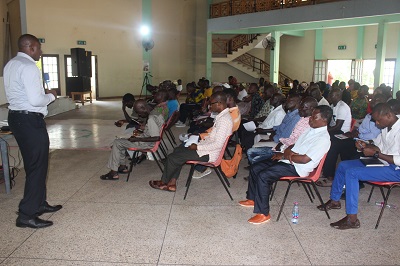
An increased surveillance in the transportation and distribution of fertilisers is needed to curtail smuggling to save the Planting for Food and Jobs (PFJs) programme from being corrupted, Prof. Joseph Yaro Awetori, Director, Regional Institute for Population Studies (RIPS) at the University of Ghana, has advocated.
He said: “Culprits should be sanctioned appropriately to serve as a deterrent to would-be miscreants who may want to corrupt the system.”
Prof. Awetori made the recommendation in findings on: “Assessment of the Planting for Food and Jobs programme: perspectives from beneficiary farmers” at the annual general meeting of the Peasant Farmers Association of Ghana (PFAG), held at Fijai, Takoradi, on the theme: ‘The role of peasant farmers in achieving Ghana Beyond Aid.”
The PFAG with the vision to advocate a dignified life for its members, and beneficiaries of the PFJ programme, sought funding from the Open Society Initiative for West Africa (OSIWA) to engage the Centre for Development Research and Agro-Innovation (CEDRAI), to monitor the implementation of the PFJ for the period of 2018 and 2019.
The research also assessed PFJs performance.
This year’s PFAG meeting reviewed the group’s strategic plan that reflected on the current developmental path and making it more relevant in executing its mandate, especially in advocacy and service delivery for its members to generate wealth.
Prof. Awetori added: “Farmers reported of the late arrival of chemical fertilisers much latter after the planting season is over. Again, farmers reported cases of elite capture, political interference at the local level, hijacking, diversion, and smuggling of fertilisers which defeats the aims and effectiveness of the programme.”
He said that market access was the main incentive to farmers’ readiness to adopt and upscale production.
“Other major challenges of the PFJs included, the cumbersome and time consuming registration procedures, which had the potential to discourage farmers from registering and thus participating in the process, inaccessibility to improved certified desired seeds of improved varieties by more than 50 per cent of the farmers due mainly to poor selection of varieties and the late arrival of inputs for farming due to poor planning on the part of programme managers.
“The inability to design activities and strategies that increase the market absorption leads to unprofitable farming ventures. Poor storage and post-harvest management led to high loses. This works in the same way as poor markets in reducing the viability of agriculture as a commercial profit-making activity capable of attracting the youth and reducing unemployment,” Prof. Awetori said.
He, therefore, recommended the timely release to the farmers, adequate quantities of certified desired seeds of improved varieties of good quality, eliminating the disease of late delivery of fertilisers to farmers by making them available all year round.
“This will help the farmers to plan. The PFJs has the potential to stimulate the commercialisation of small-scale agriculture in Ghana as farmers acquire more inputs and in turn sell greater proportion of outputs to markets,” he said.
FROM CLEMENT ADZEI BOYE, TAKORADI







